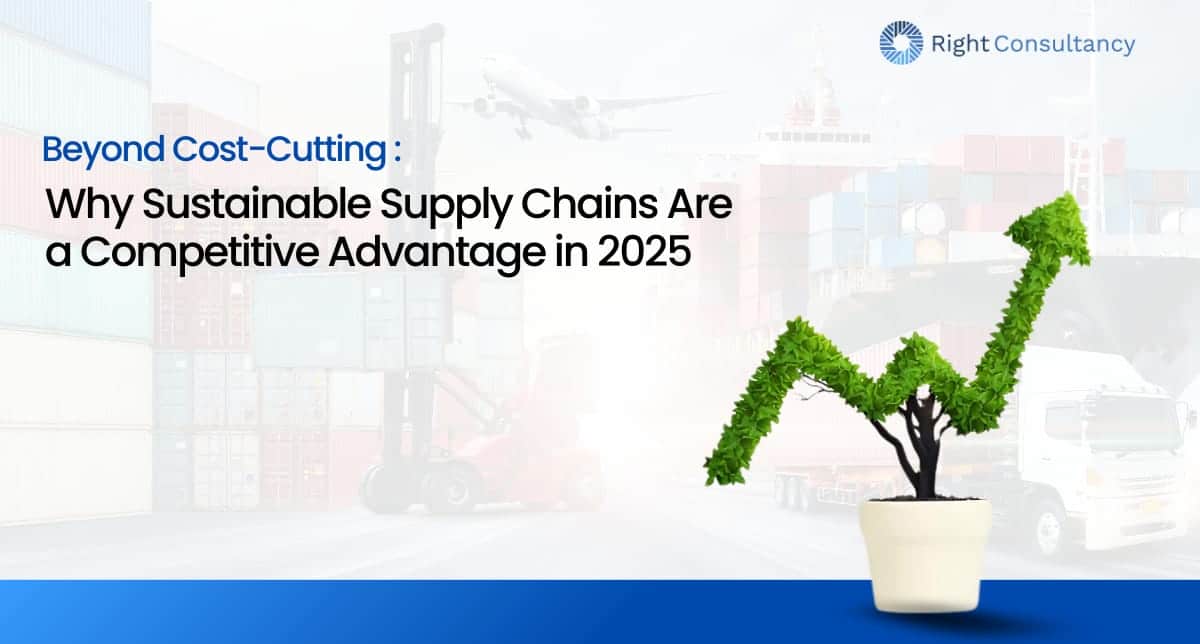Beyond Cost-Cutting: Why Sustainable Supply Chains Are a Competitive Advantage in 2025
Beyond Cost-Cutting: Why Sustainable Supply Chains Are a Competitive Advantage in 2025

For decades, supply chains were optimized for one thing: cost reduction. The cheapest materials, the lowest labor costs, the most efficient logistics – these were the benchmarks of a successful operation. But in 2025, the game has changed. Today, the most successful companies are those that see sustainability not as an expense, but as a strategic advantage that drives profitability, resilience, and long-term growth.
Global brands have already proven that sustainability isn’t just about compliance or public image – it’s a business necessity. Companies that integrate sustainability into their supply chains are reducing risks, strengthening customer loyalty, and securing investor confidence.
1. Sustainability Is a Growth Driver, Not a Cost BurdenMany companies assume that sustainability increases costs, but those leading the way are proving the opposite.
A multinational consumer goods company restructured its supply chain to reduce water consumption and waste. The result? Millions saved in operational costs and increased efficiency across global manufacturing plants.
A logistics giant optimized delivery routes and incorporated alternative fuel vehicles, cutting fuel costs and saving hundreds of millions annually.
By reducing waste, improving energy efficiency, and sourcing materials responsibly, businesses are not just lowering their environmental impact – they are cutting unnecessary costs and improving profitability.
2. Consumer Preferences Have ShiftedToday’s customers demand transparency. More than 70% of global consumers say they prefer brands that prioritize sustainability, and they’re willing to pay more for it.
A leading outdoor apparel company built its brand on sustainable practices, encouraging customers to repair products rather than replace them. This unconventional approach didn’t hurt sales – it drove brand loyalty and revenue growth.
A global furniture retailer committed to making all its products from recycled or renewable materials. Instead of increasing costs, this move created a competitive advantage, attracting eco-conscious consumers and strengthening its brand reputation.
Sustainability is no longer just an ethical choice – it’s a key differentiator that builds long-term customer trust.
3. Regulatory Pressures and Supply Chain ResilienceGovernments worldwide are tightening regulations around emissions, waste management, and labor practices. Companies that proactively align with these policies are avoiding costly penalties and staying ahead of the curve.
A leading technology company faced scrutiny over its supply chain practices. In response, it transformed its procurement strategy, ensuring that 100% of key raw materials were responsibly sourced. This not only helped the company avoid regulatory challenges but also secured more stable supplier relationships.
A global sportswear brand eliminated virgin plastics from its supply chain, adapting ahead of incoming restrictions. By acting early, the company gained a competitive edge and strengthened its brand positioning.
Beyond regulations, sustainability also enhances supply chain resilience. With climate change and geopolitical tensions causing disruptions, companies that invest in local sourcing, circular economies, and diversified suppliers are less vulnerable to unexpected shocks.
4. Investors Are Paying AttentionSustainability is now a major factor in investment decisions. Large asset management firms are prioritizing companies with strong ESG (Environmental, Social, and Governance) metrics, recognizing that sustainable businesses are more stable and profitable in the long run.
A global food and beverage company committed to cutting emissions across its entire supply chain. This move not only positioned the company as an industry leader but also increased investor confidence, attracting significant funding for future expansion.
The world’s largest asset manager has made it clear – companies that fail to integrate sustainability into their supply chains will struggle to secure investment.
Investors are no longer just looking at quarterly profits; they’re evaluating long-term sustainability and risk management strategies.
5. The Road to a Competitive, Sustainable Supply ChainFor companies that want to future-proof their supply chains, the path forward is clear:
- Invest in Green Logistics – Optimize transportation, transition to electric or alternative-fuel fleets, and minimize packaging waste.
- Embrace Circular Economy Models – Design products for reuse, repair, and recycling to reduce material waste and production costs.
- Enhance Supplier Transparency – Work with ethical suppliers, conduct audits, and use blockchain technology for end-to-end visibility.
- Leverage AI and Automation – Predict demand fluctuations, optimize resource use, and improve overall efficiency.
Sustainability is no longer just about doing the right thing – it’s about securing long-term profitability, customer loyalty, and business resilience. The companies that recognize this shift and act decisively will be the ones leading their industries in the years to come.
The question is no longer whether sustainability matters – it’s how quickly businesses can turn it into a competitive advantage.
